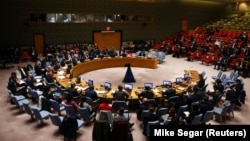Seventy-nine years ago, with the Second World War barely in the rear-view mirror, the newly formed Security Council of the United Nations met for the first time. Its chief mandate was to ensure international peace and security. Consisting of five permanent member and ten non-permanent, rotating seats, it reflected post-war power structures: the overwhelming majority represented the northern hemisphere, with four out of the permanent seats held by Western powers, with China holding the fifth seat.
In September, the United Nations will hold the Summit of the Future, where world leaders will meet to forge the Pact for the Future, a roadmap for the next generation of international cooperation.
“And that includes ensuring that people across Africa are effectively represented,” said U.S. Permanent Representative to the UN, Linda Thomas-Greenfield.
“This is long overdue. Already home to over 1.2 billion people, half of whom are under the age of 19, Africa has the fastest growing population of any continent. By 2050, one in four people on the planet will be African.”
Indeed, when the Security Council first met in 1945, most of today's African countries were just shaking off colonial rule and had no voice in international affairs. Today, 54 African countries with a combined population of over 1.2 billion people account for 28 percent of the membership of the United Nations, yet they have no permanent representative in the Security Council. That’s despite the fact that half of all country-specific or regional conflicts on the Council's agenda concern Africa.
“When we talk about reforming this Council, strengthening this Council, we do so not just for the good of African nations, but to further international peace and security for us all. Because we all benefit when African leaders are at the table,” said Ambassador Thomas-Greenfield.
“And so, as President Biden announced during the UN General Assembly two years ago, and reaffirmed last year, the United States supports permanent representation on the Council for countries from Africa, as well as Latin America, and the Caribbean. Permanent representation.”
“Today, fifteen of us sit around this table and it is my hope that the number grows to include permanent seats for Africa, Latin America, and others,” said Ambassador Thomas-Greenfield. “And that, in so doing, we are better equipped to live up to the mandate, our mandate, to prevent the scourge of war and advance peace and security for future generations.”














